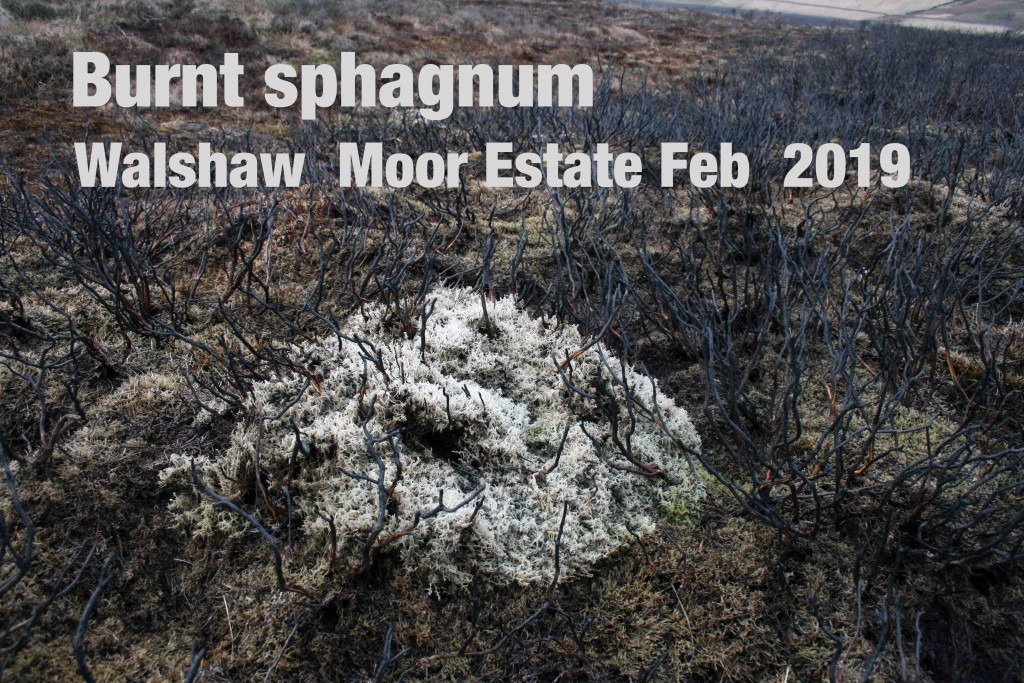Natural England is to investigate a grouse-shooting estate’s recent burning of sphagnum moss and apparently unconsented construction of infrastructure on the highly-protected Natura 2000 site of Walshaw Moor, above Hebden Bridge.
Walshaw Moor Estate has undertaken these actions in order to intensify their industrial-scale grouse shooting business.
Natural England has agreed to investigate Walshaw Moor Estate’s:
- apparent deepening and widening of ditches that they’ve been paid to block, on Heather Hill blanket bog
- unconsented construction of steps up to newly constructed grouse shooting butts in deep peat/blanket bog adjacent to Hole Sike
- apparently unconsented construction of a tarmac car park
- burning which destroyed sphagnum moss

Walshaw Moor Estate’s actions were identified by members of Ban the Burn, who regularly monitor the moor for burning and new unconsented infrastructure that might contravene the Walshaw Moor Estate Catchment Restoration Plan 2017-2042 and Environmental Stewardship Agreements between the Estate and Natural England.
Monitoring guidelines breached as a result of government spending cuts
Ban the Burn volunteers carry out this work because over the last decade, successive governments have slashed Natural England’s budget by more than half.
So Natural England doesn’t have enough staff to monitor Walshaw Moor Estate’s compliance with the Walshaw Moor Estate Catchment Restoration Plan 2017-2042 and Environmental Stewardship Agreements.
47% of Sites of Special Scientific Interest (such as Walshaw Moor Estate) have not been monitored in the last six years, in breach of national monitoring guidelines.
In a reply to Ban the Burn’s Freedom of Information request, Natural England said they will investigate these new unconsented changes carried out by Walshaw Moor Estate.
Ban the Burn monitors have asked Natural England to clarify their time frame for their investigations, including their intended start date and deadline for completing them.
They have also offered to meet Natural England on Walshaw Moor for a site visit to the relevant locations that they intend to investigate, and to follow up some additional issues:
- Why is Natural England not pushing to have an unconsented, redirected watercourse reinstated to its original bed?
- Why did Natural England not consider WME’s recent installation of 10 grouse butts into deep peat to be damaging to the South Pennine Moors SSSI, according to the Walshaw Moor Estate Catchment Restoration Plan 2017-2042?
Regarding the new grouse butts, Ban the Burn monitor Ros Berrington said,
“We feel we have not received an adequate answer as to why N.E allow this damaging practice. Will they agree to address it? And when ?
Those of us who go up to Walshaw Moor regularly are also becoming increasingly worried as to the many new vehicle tracks that are appearing all over it. We will contact Natural England about this in a separate correspondence.”
The RSPB’s Senior Policy Officer (uplands), Pat Thompson said,
“The RSPB are still waiting (!) for NE to conclude their investigations on previous cases where burning has apparently occurred on areas where the owner no longer has permission to do so.
We continue to press Government to end burning in the uplands.
We recently sent a joint letter (with 24 other wildlife/sustainability groups) to the new Minister calling on her to make good the previous Government commitment to end burning. We are pressing Defra hard.
We are still in dialogue with the European Commission about our legal challenge to the UK government for failing to stop damaging burning on a Special Area of Conservation.
We aren’t giving up! We will use any new records of burning on peat to substantiate our case.”
You can find the questions Ban the Burn sent to Natural England in June 2019 here:

Pingback: Natural England’s situation is hopeless, says Walshaw Moor monitor as Defra rejects legally binding targets for moorland restoration | Upper Calder Valley Plain Speaker
I’m glad you mention NE’s slashed budget. Not long after he took over, Tony Juniper appeared on the Today programme talking about how under-resourced they are. However, I remain disappointed that he’s so far been unable to turn the organisation round to become the environmental protector it should be. I’m inclined to think there’s more to it than lack of cash. Culture and vested interests must surely have a part to play?